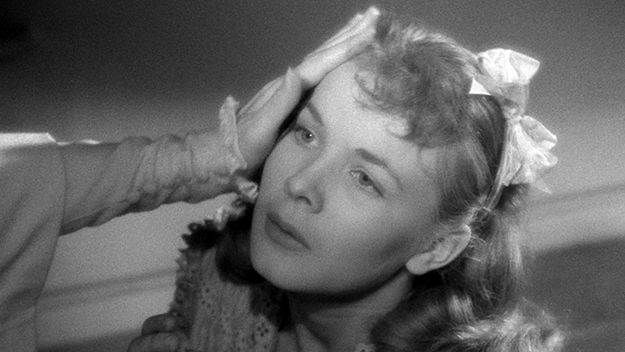
Jacqueline Audry’s film Olivia (1949), based on the novel by Dorothy Bussy, is almost entirely anomalous in the history of French cinema. Not only is Olivia a film directed by a woman, but it’s also a film that depicts queer relationships made in the fifties. Olivia was controversial in its time, to say the least, though in recent years a critical rediscovery of Audry has revived the film’s reputation.
Olivia opens with the title character’s (Marie-Claire Olivia) arrival at a girl’s finishing school in France. The school was founded and is run by Miss Julie (Edwige Feuillère) and Miss Cara (Simone Simon). Miss Julie fosters a highly sexualized form of pedagogy that encourages a competition with Miss Cara for favoritism amongst the students. In this embroiled atmosphere of intrigue it isn’t long before Olivia takes sides.
Olivia is a film of secret desires and hidden romances where proclamations of affection must be disguised as readings from Racine. Olivia does more than take sides, she falls in love with Miss Julie. It’s implied in the film that Olivia, before leaving England, was already aware of her own homosexuality. When Olivia describes her experiences at her English boarding school she says “I felt like a freak, a black sheep”. In Miss Julie she finds the connection she has been seeking.
In a similar fashion it is implied that Miss Julie and Miss Cara were, at the time that they founded the school, a couple though by the time of the events in Olivia occur Miss Julie has been replaced in Cara’s affections by Frau Riesener (Lesly Meynard). When things come to a head between Miss Julie and Miss Cara, Miss Julie gives her notice. As the lawyers arrive to oversee the separation agreement between these business partners, Miss Dubois (Suzanne Dehelly) observes “It’s worse than a divorce”.
Those moments where repressed sexuality finally finds its expression are electrifying. In the “Christmas ball” sequence the girls enter in costumes, coupled together with one in drag as a man. They enter dancing then take their place. After Miss Cara and Miss Julie open the ball for dancing, Miss Julie approaches Cécile (Nadine Olivier), whose beauty she has often commented upon. As Miss Julie approaches Cécile, Cécile opens her arms and the women embrace. Julie bites Cécile’s neck passionately and the music swells. It isn’t a cue of danger or terror, rather the music suggests a thrill.
All of the character motivations in Olivia are rendered in subtext and innuendo. The film requires all of Audry’s craft as a filmmaker to compose visual cues that amplify these covert signifiers. Today Olivia may seem pretty transparent but that is only because the codification of homosexuality in film has become part of mainstream culture. In the fifties, Olivia was an extraordinarily revolutionary act of cinema; celebrating queer identity and feminism equally. Olivia is a film in the tradition of Leontine Sagan’s Mädchen in Uniform (1931); a predecessor to the more liberated films of the nineties.
